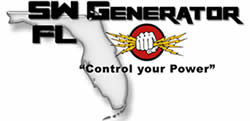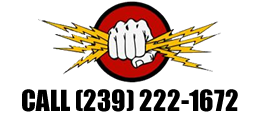Whole House Generator vs. Portable Generator: Which is Right for You?
When it comes to ensuring your home or business remains powered during an outage, choosing the right generator is crucial. At SWFL Generator, we are SWFL’s premier residential and commercial generator installers. In this blog, we’ll compare whole house vs. portable generators to help you make an informed decision.
Whole House Generators
1. Overview
Whole house generators, also known as standby generators, are permanently installed outside your home. They automatically provide power during an outage.
2. Power Capacity
These generators are designed to power your entire home. They can handle heavy loads, including HVAC systems and appliances.
3. Automatic Operation
Whole house generators start automatically during a power outage. There’s no need for manual intervention.
4. Fuel Source
They typically run on natural gas or propane. This ensures a continuous fuel supply without the need for refueling.
5. Installation
Professional installation is required for whole house generators. This ensures they are safely and correctly connected to your home’s electrical system.
6. Maintenance
Regular maintenance is essential to keep your whole house generator in optimal condition. At SWFL Generator, we offer maintenance services to ensure reliability.
Portable Generators
1. Overview
Portable generators are movable units that can be used to power specific appliances or areas during an outage.
2. Power Capacity
These generators have lower power capacities compared to whole house generators. They are ideal for powering essentials, like lights and small appliances.
3. Manual Operation
Portable generators require manual setup and operation. You need to start them and connect them to the desired appliances.
4. Fuel Source
Portable generators typically run on gasoline. This requires you to have fuel on hand and refill the generator as needed.
5. Installation
No professional installation is required for portable generators. Simply set them up in a well-ventilated area and connect the devices you need.
6. Maintenance
Regular maintenance is necessary, but it is usually less complex than for whole house generators. Ensure the generator is kept clean and well-fueled.
Key Considerations
1. Power Needs
Assess your power needs to determine which type of generator suits you best. Whole house generators are ideal for complete home power, while portable generators are suitable for essential power needs.
2. Budget
Whole house generators are more expensive due to their higher capacity and installation costs. Portable generators are more affordable but offer limited power.
3. Convenience
Whole house generators offer unparalleled convenience with automatic operation. Portable generators require manual setup and operation.
4. Fuel Supply
Consider the fuel supply and availability. Whole house generators with natural gas or propane provide a continuous fuel supply, while portable generators need regular refueling with gasoline.
Final Thoughts
Both whole house and portable generators have their advantages and drawbacks. Your choice depends on your specific needs, budget, and preference for convenience.
Whole House Generators Pros:
- Automatic operation
- High power capacity
- Continuous fuel supply
- Professional installation and maintenance
Cons:
- Higher cost
- Requires installation
Portable Generators Pros:
- Affordable
- No installation required
- Easy to move and store
Cons:
- Manual operation
- Limited power capacity
- Requires frequent refueling
Contact Us
For expert advice and generator installation, trust SWFL Generator. Contact us at (239) 222-1672 or visit to learn more about our services. We are dedicated to providing top-quality service and ensuring your power needs are met.
By carefully considering your power needs and preferences, you can choose the right generator to keep your home or business powered during outages. At SWFL Generator, we’re here to help you make the best decision for your situation.
